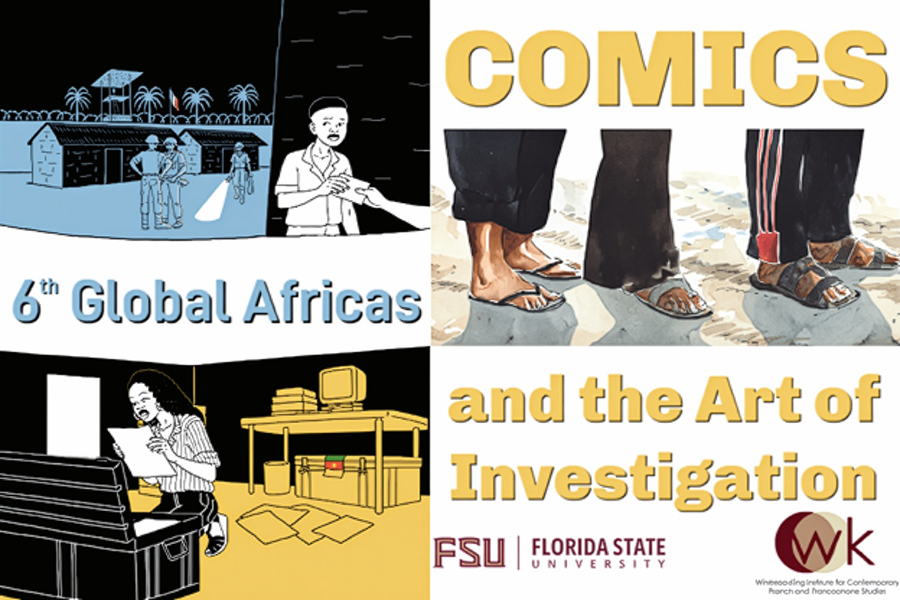6th Global Africas: Comics and the Art of Investigation

About the Event
Comics, in their many forms, can be rich sites of multimodal meaning-making where image, text, visual style, color, and layout are but some of the key elements that work in concert to generate narratives and shape our understanding of them. Some short-form comics such as editorial cartoons, strips, and even instruction pamphlets mobilize a deft visual economy that often relies on abstraction and sometimes stereotypes, especially in the case of satire and caricature. Longer-form comics including ongoing series and stand-alone graphic novels can also employ abstraction and stereotypes while also simultaneously engaging with genre-specific conventions and experimenting with innovation. Indeed, in the face of comics’ plasticity, French scholar and comics expert Thierry Groensteen posits them as a system rather than a genre or medium. Additionally, the facile categorization of comics as a subset of children’s and popular literatures have long been overturned for decades, especially in the wake of work by Art Spiegelman, Marjane Satrapi, Chris Ware, and Joe Sacco, to name but a small number of significant and highly influential practitioners.
The 6th Global Africas event, “Comics and the Art of Investigation,” is a symposium dedicated to exploring the increasing use of comics as a site of inquiry featuring artists Gaspard Njock and Annick Kamgang. Though their visual styles and narrative approaches differ, these artists equally draw from both their own experiences and research to generate contemplative graphic novels that inform readers of complex sociohistorical realities through human interactions. Gaspard Njock, originally from Cameroon and based in France, often uses expressive brushwork and watercolors to explore the feeling of fluidity characteristic of migrants’ experiences (e.g., Un Voyage sans retour, 2018; Au-delà l’exil, 2024). Applying a similar visual style to others’ stories (e.g., Aldo Manuzio, 2015; Maria Callas: L’enfance d’une diva, 2020), Njock immerses his readers in the vibrant textures of characters’ quotidian lives in pursuit of deep personal connections, sometimes across time, space, and cultures. In contrast, Annick Kamgang, whose father was from Cameroon and whose mother was from the French Overseas Department of Guadeloupe, employs a highly-legible and clean visual style as an effective vehicle for comics journalism. Whether in black and white (Lucha: chronique d’une revolution sans armes au Congo, 2021) or strategically-applied color (“Cameroun 1960: Marthe Moumié raconte,” 2025; Les Enfants du pays, 2025). Kamgang’s compelling work walks the line between visually striking and informative.
Gaspard Njock
Gaspard Njock is a multidisciplinary artist born in 1985 in the coastal city of Douala, in Cameroon. He has created, produ- ced and distributed theatre productions which merge music and visual art, placing cen- tral emphasis on music from the Opera and illustration. He teaches drawing and the interrelationship between artistic discipli- nes at the Public School of Design, CY at Cergy-Paris University as well as live-model drawing at the École Supérieure of Design, Arts & Communication (ESDAC Paris), and Art History at the Museum of Decorative Arts in the Parisian workshops of Carrousel.
Annick Kamgang
Annick Kamgang is a comics author and illustrator. She was born and raised between Central Africa (Cameroon, CRA) and the French West Indies (Guadeloupe). Her first graphic novel, Lucha, created with journalist Justine Brabant, was published in May 2021 by La Boîte à Bulles, in collaboration with Amnesty International. It tells the story of human rights activists in the Democratic Republic of the Congo. Recently releaded by La Boîte à Bulles on 3 September, Les Enfants du pays, her second graphic novel, a solo project, explores Cameroon’s war of independence through her family history. Kamgang also frequently collaborates with other organizations and presses including: The Ink Link, La Déferlante, La Revue Dessinée, Jeune Afrique, and Cartooning for Peace.
Dr. Mora Beauchamp-Byrd
Director of Museum and Cultural Heritage Studies, Associate Professor of Art History, FSU
An art historian, arts administrator, and curator, she specializes in the art and visual culture of the African Diaspora; Art of the Americas, with a focus on Modern and Contemporary African American art and Caribbean art; British art, including appropriations of the 18th-century graphic narratives of William Hogarth, and The Black Arts Movement in Britain during the 1980s and 90s; Global modern and contemporary art; Museum and Curatorial studies; and representations of race, class and gender in American comics, with an emphasis on animation and African American newspaper comics during the Golden Age of Comics (1938-1955). She has also organized numerous exhibitions including Transforming the Crown: African, Asian and Caribbean Artists in Britain, 1966-1996 (presented at The Bronx Museum of the Arts, The Caribbean Cultural Center, and The Studio Museum in Harlem); When I Am Not Here/Estoy Alla: Photographs by Maria Magdalena Campos-Pons; Struggle and Serenity: The Visionary Art of Elizabeth Catlett; Transcending Silence: The Life and Poetic Legacy of Audre Lorde; Petrona Morrison and Veronica Ryan: Sculptural Works; The Worldview of Katherine Dunham; Picturing Creole New Orleans: The Photographs of Arthur P. Bedou; and Little Nemo’s Progress: Animation and Contemporary Art.
Dr. Michelle Bumatay
Assistant Professor of French, Director of the Global Africas series, FSU
Dr. Bumatay specializes in cultural production from francophone Africa and the African Diaspora. She is the author of On Black Bandes Dessinées and Transcolonial Power (The Ohio State University Press) that explores the diversity of francophone cartoonists’ artistic, narrative, and material practices and illustrates the reparative dimensions of their work. She has contributed to numerous anthologies on global and francophone comics and has articles in several journals. Additionally, she currently serves on several editorial boards for journals dedicated to French & Francophone Studies and Comics Studies.
Monday, Nov. 10
2:15 p.m. — coffee/pastries 4th floor of Diffenbaugh
3-3:45 p.m. — Gaspard Njock, “Putting migrants on a pedestal: An exile from sign to aesthetic object beyond miserabilist narratives”
- Participation via Zoom
4-4:45 p.m. — Annick Kamgang, “Marthe Moumié: A Forgotten African Anti-Colonial Activist”
- Participation via Zoom
5-6 p.m. — Gaspard Njock, Annick Kamgang, Mora Beauchamp-Byrd, Michelle Bumatay: Round Table
- Participation via Zoom
6-6:45 p.m. — Dédicaces
